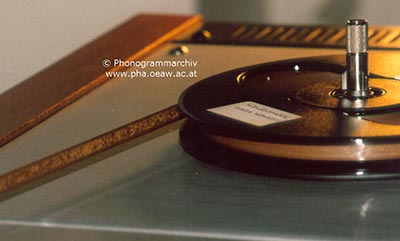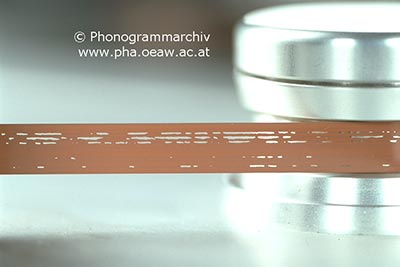| Table of Contents |
|---|
...
HDV is a high-definition variation of the DV video encoding specification that uses MPEG-2 compression to achieve the same data rate as the DV, DVCAM, and DVCPRO video encoding specifications. It was developed by Sony, Canon, JVC and Sharp and was introduced to the consumer market in 2003. HDV video can be captured in 720p, 1080i, and 1080p and can be recorded using MiniDV or Standard DVC cassettes.
Identification
...
| Info | ||
|---|---|---|
| ||
Sony DVM-63HD HDV Cassette (63 Minutes). B&H Foto & Electronics Corp. Accessed February 23, 2021. |
| Info | ||
|---|---|---|
| ||
https://en.wikipedia.org/wiki/HDVMiniDV cassettes for DV and HDV recording. Wikipedia the Free Encyclopedia. Accessed February 23, 2021. |
Physical Characteristics
...
| Tape width | |
|---|---|
| Tape composition | |
| Cassette dimensions | |
| Container dimensions | |
| Identifying features | |
| Common manufacturers/brands | |
| Playback |
...
Types of damage and deterioration
...
Binder deterioration
| Info | ||
|---|---|---|
| ||
"1.1.3. Inspect for damage / Look for chemical deterioration / Binder degradation". In Audio Tape Digitisation Workflow. Accessed February 22, 2021. |
Description
Commonly known as "sticky shed syndrome." Affected records will have a visible gummy or powdery residue on the surface of the tape. This can damage both the recorded material and playback equipment. Back-coated tapes are most affected by this type of deterioration.
...
Baking: Holding the tape at an elevated temperature (45°C to 55°C) for a brief period of time (up to 36 hours) can temporarily remove moisture and allow normal playback for a period of one to two weeks. Tapes should not be rewound before baking.
Drop-out
https://www.musiikkiarkisto.fi/audio/audio113.html
| Info | ||
|---|---|---|
| ||
"1.1.3. Inspect for damage / Look for chemical deterioration / Binder degradation". In Audio Tape Digitisation Workflow. Accessed February 22, 2021. |
Description
A brief signal loss caused by a tape head clog, missing magnetic oxide particles, tape defect, or debris on the tape or machine. These factors can reduce head-to-tape spacing and result in the appearance of white spots or streaks on playback. Multiple drop-outs per frame will result in a snowy appearance.
...
Visit the /wiki/spaces/ALC/overview for further reading on /wiki/spaces/ALC/pages/1891631115.
References
...
AMIA. "Video Preservation Factsheets." Accessed December 10, 2020.
Avid. "Working With HDV." Accessed February 3, 2021.
Bensinger, Charles. "Chapter 6: All about videotape." In The Video Guide, Second Edition, 71-75. Santa Barbara, California: Video-Info Publications, 1981.
Bogart, John Van. "What Can Go Wrong With Magnetic Media?" In Magnetic Tape Storage and Handling: A Guide for Libraries and Archives. Washington, DC: The Commission on Preservation and Access, 1995.
Casey, Mike. "FACET: Format characteristics and preservation problems." Bloomington, IN: Indiana University, 2007.
Gibson, Gerald. D. "Magnetic tape deterioration: recognition, recovery and prevention." Paper presented at the IASA Conference, Perugia, August 26, 1996.
MediaCollege.com. "The HDV Video Format." Accessed February 3, 2021.
Museum of Obsolete Media. "HDV (2003 – 2011)." Accessed February 3, 2021.
Preservation Self Assessment Program. "Videotape: HDV." University of Illinois at Urbana-Champaign. Accessed February 3, 2021
Wheeler, Jim. "Videotape preservation handbook." 2002.
Version history
...
| Version | Date | Author(s) | Version Notes |
|---|---|---|---|
...



